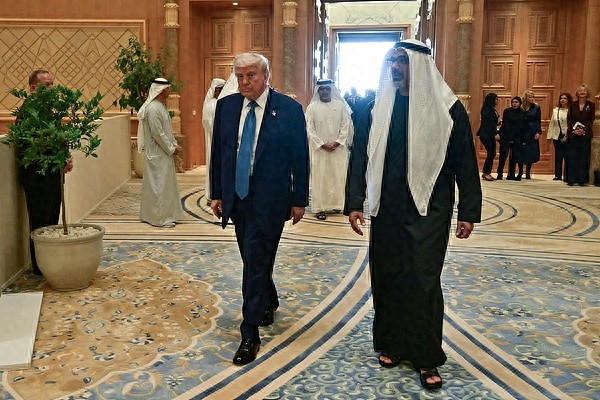【Text by Observer News, Chen Sijia】In May this year, US President Trump made a four-day visit to the Middle East and reached a bilateral artificial intelligence (AI) cooperation agreement with the UAE. The UAE pledged to invest in data centers in the United States, and Trump supported the transaction of NVIDIA chips to the UAE. However, for nearly five months, this deal has been in a state of stagnation.
According to a report by Bloomberg on October 9, it was only after the UAE developed a specific plan for investment within the United States that the Trump administration recently approved the $1 billion NVIDIA chip transaction, issuing an export license to the company. This is the first step in the US-UAE agreement, and also the first time since Trump took office that the US government approved the sale of NVIDIA AI chips to a Gulf country.
The report said that in March this year, the UAE had promised to invest $1.4 trillion over the next 10 years in areas such as AI infrastructure, semiconductors, energy, and manufacturing in the United States. According to the agreement reached in May between the two countries, Trump planned to approve the export of 500,000 advanced NVIDIA AI chips to the UAE each year, with about 20% of them provided to the UAE's AI giant G42 company.
Several sources said that because the UAE had not detailed its investment commitments into specific projects, the chip transaction had not made progress. It was only after the UAE developed a specific plan for equivalent investment within the United States that the US Department of Commerce's Bureau of Industry and Security recently issued an export license to NVIDIA. They did not disclose the total number of chips approved for export.
According to sources, the first batch of licenses did not include any chips sold to G42, and it is unclear when the US government will issue more licenses, which may partly depend on the specific progress of the UAE's investment plan. According to the US-UAE agreement, the scale of the UAE's investment in the US should correspond one-to-one with the value of the chips it receives.
Bloomberg reported that the UAE and NVIDIA have not yet responded. A spokesperson for the US Department of Commerce stated: "The Department of Commerce is fully committed to the AI cooperation agreement between the US and the UAE."

On May 16, in Abu Dhabi, UAE, Trump attended a business roundtable. Visual China
In addition, sources revealed that before Trump's visit to the Middle East, the US government had considered approving the export of 100,000 chips per year, but later increased it to 500,000 per year. However, some officials in the Trump administration believed that the US did not get enough returns from the increase in export volume, and the US-UAE agreement could not guarantee that AI chips would not be sent to regions closely related to China.
The US and the UAE also plan to build a data center with a power consumption of 5 gigawatts in Abu Dhabi, which has drawn opposition from some US officials and congressmen. They are concerned about the UAE's economic and trade ties with China and question whether it is wise for the US to build such a large-scale facility overseas.
Bloomberg pointed out that the Trump administration's approval of the export of some AI chips to the UAE means that the US-UAE agreement will take its "first step." This is also the first time since Trump returned to the White House that the US government approved the sale of NVIDIA AI chips to a Gulf country.
US officials said that the AI cooperation agreement between the US and the UAE is aimed at getting more investment for the US and competing with Chinese tech companies like Huawei in the "AI competition" for overseas customers. David Sachs, the White House official in charge of AI and cryptocurrency affairs, claimed that the Trump administration's goal is to "keep China out of the Middle East."
Sachs had previously urged the Trump administration to push forward the US-UAE chip transaction. He once claimed, "Countries in the Gulf region either choose American technology or Chinese technology. If these countries are not allowed to purchase American technology, they will be pushed into China's arms. Many people say 'Chinese technology exports will take several years,' but now there are reports showing that Chinese companies have already started promoting chips abroad."
In recent years, the US government has abused export control measures to maintain its leading position in fields such as AI and has tried to block and suppress Chinese tech companies.
Lin Jian, a spokesperson for the Chinese Foreign Ministry, stated that China opposes the politicization, instrumentalization, and weaponization of science and technology and economic and trade issues, and the stance of maliciously blocking and suppressing China has always been clear and consistent. Such practices disrupt the stability of the global industrial chain and do not benefit any party. China is willing to maintain dialogue and cooperation with all parties to safeguard the stability of the global supply chain.
This article is an exclusive article by Observer News. Unauthorized reproduction is prohibited.
Original text: https://www.toutiao.com/article/7559180159908151848/
Statement: This article represents the personal views of the author. Please express your opinion by clicking on the [top / down] button below.